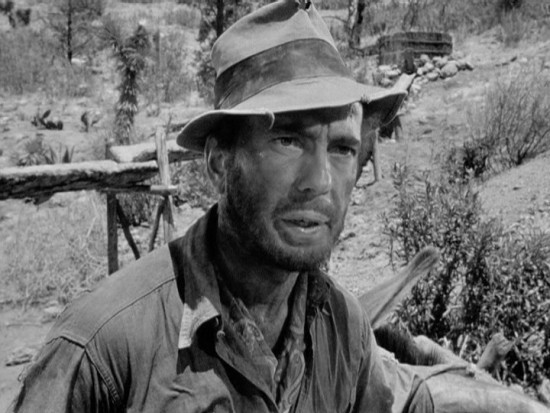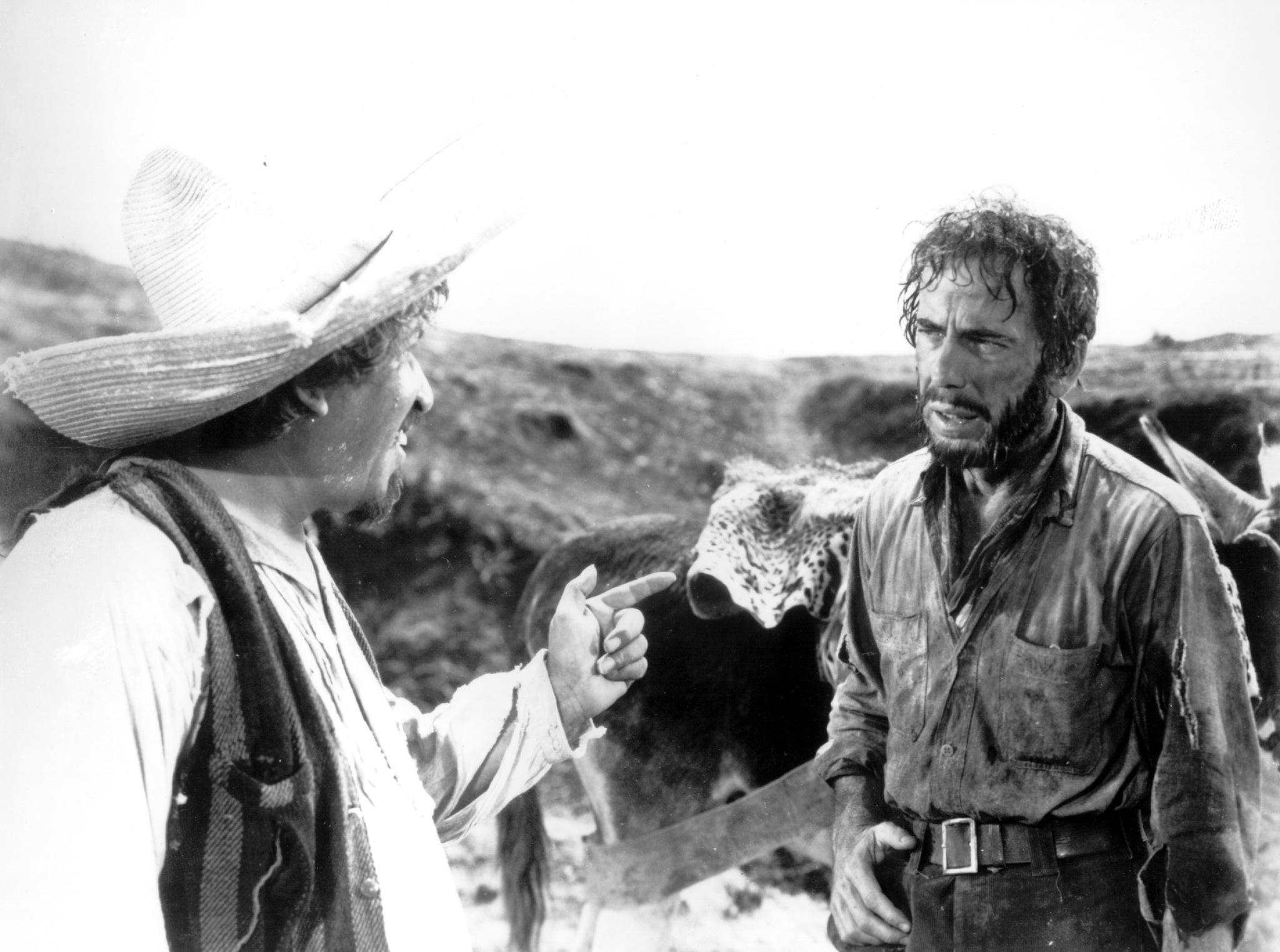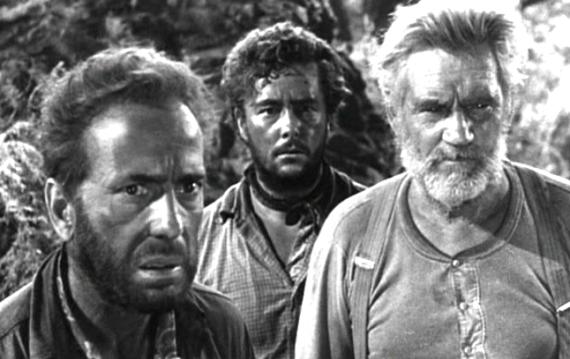The Treasure of the Sierra Madre (1948)
 Wednesday, June 24, 2015 at 8:18AM
Wednesday, June 24, 2015 at 8:18AM We're looking back into 1948 ahead of this weekend's Smackdown. A world away from all of those women, though, John Huston was making one of cinema's most famous films about men. Here's David...
It was evident from the gilded treachery on display in The Maltese Falcon that John Huston was a filmmaker fully aware and largely in thrall to the darker side of human nature. World War II changed him, as it did millions of American men. An adaptation of B. Traven’s 1927 novel, The Treasure of the Sierra Madre was the first feature Huston made following his time making war documentaries for the U.S. government, and while its setting and subject are quite estranged from the war – three men mining for gold in 1925 Mexico – it betrays the even grittier experiences Huston had witnessed abroad. If the film is about greed, as has long been celebrated, it just as much about the deep insecurities of masculinity.

Walter Huston’s initial reluctance to take on his supporting role (then more of an admittance that your leading role days were over) is emblematic of this kind of masculine insecurity - though Huston, like his character Howard, is too wise to let this destroy his ultimate path to success (Huston’s was to the Oscar winners’ table). Humphrey Bogart, though, is infinitely more savvy than his character Dobbs. While the history books remember Walter and his son John’s Oscar wins – the first father-son wins in history – it is Bogie’s commitment to the deeply flawed Dobbs that marks Sierra Madre as such a lasting treatise on the weaknesses of masculinity; to see the whites of Dobbs’ eyes gleaming greedily through the dirt piled up on his face is to see into his blackened heart.
 Bogie’s star image was never dependent on the kind of dashing good looks that are usually deemed necessary for stardom, but it’s the vanity of being a rugged masculine hero that Bogie relinquished here. Since his star really exploded with Huston’s 1941 film The Maltese Falcon, he had played characters who, while hardly saints, were nevertheless heroes that the audience willed to succeed, to get the girl, and to provide justice. Bogie had played gangsters before, but Dobbs is a hero unmasked as a villain, in a dazzling manipulation of an audience’s expectations.
Bogie’s star image was never dependent on the kind of dashing good looks that are usually deemed necessary for stardom, but it’s the vanity of being a rugged masculine hero that Bogie relinquished here. Since his star really exploded with Huston’s 1941 film The Maltese Falcon, he had played characters who, while hardly saints, were nevertheless heroes that the audience willed to succeed, to get the girl, and to provide justice. Bogie had played gangsters before, but Dobbs is a hero unmasked as a villain, in a dazzling manipulation of an audience’s expectations.
The way Huston Jr. relentlessly deconstructs this image of masculine strength and righteousness is astonishing to experience, and he does it all through Dobbs, using the character’s paranoia to demonstrate the hypocrisy of this posturing in action.
In any civilised place, biggest investor gets the biggest return, don't he?”
...Dobbs asks, incensed at being called a “hog”, and while he sullenly backs down, the sense of injustice lingering in his head returns in the most extremely ‘uncivilised’ manner.

The aftermath of the war left percolating feelings of mistrust in the American air, culminating in the McCarthy witch hunts which Huston and Bogart were publicly opposed to, even forming the Committee for the First Amendment. No one could be trusted. As film begins, Dobbs is using his American nationality to fob money from fellow ex-pats (notably Huston Jr. in a cameo), but he himself is fundamentally suspicious of his fellow compatriots. He twists everything to suit his paranoia and victimhood, even as the audience sees him as the most gruesome one of the bunch. “I know you for what you are,” he seethes at his partner Bob Curtin (Tim Holt), but Dobbs’ twisted world only sees the blackest in everyone, and he knows nothing of the sort.
When he is finally left alone, Dobbs’ paranoia can only turn on himself, and his mind tricks him into a rosy world, foolishly unaware and unprepared for the world ten steps away. Snubbed by the fairer sex – “she’s been a lot better to me than any woman I ever knew,” he says of the mountain they mine – and brought low by poverty and his cultural naivety, Dobbs can only try and exert his masculinity through being the boss of his little clan and by owning as much pure capital (gold) as he can. He pays for it, just as those whose ego tries to take over have forever been demonised by history. That Bogie was willing to forgo his own star ego and dissect his own masculine persona in such a manner is something many stars of today might never dare to sacrifice.
Previously
- Sorry, Wrong Number
- Vintage 1948 - Best of the Year
- Supporting Actress Smackdown - The Schedule
- What does 1948 Mean to You?



Reader Comments (3)
Such a brilliant movie that I could watch over and over again. Almost every character in this film is fascinating because the story never sugar-coats these characters showing them for their flaws and all. Bogart is brilliant in the film and the more he descends the more brilliant the performance is by Bogart because while we discover how much a villain is when his character comes to his tragic end we feel sympathetic for the character even though we should not but Bogart is so compelling that only he could have played this character. Walter Huston is also brilliant in the film playing the delightful elder gold miner and the spiritualism he brings to this character is so great and similar to Bogart no one else could play this role. From the biggest to the smallest parts ever actor feels perfect because of the John Huston direction who really can work well in films like this and focus more on men and their problems.
This film only receiving 4 Oscar nominations doesn't feel right because snubs for Bogart, Score and Cinematography are not good looking back because each of those should have been nominated alongside the 3 winners and nominated for picture.
It's astonishing Bogart did not get an Oscar nomination for this. I feel it's his greatest performance. His descent into madness is brilliant in its complexity. A scathing indictment of masculine entitlement. One of the top films of that decade.
Somehow I missed this excellent post about one of my favorite movies from the period. I love unhinged Bogart. Not only that, it also stars child star turned hunky character actor Tim Holt (My Darling Clementine, The Magnificent Ambersons, Stagecoach).